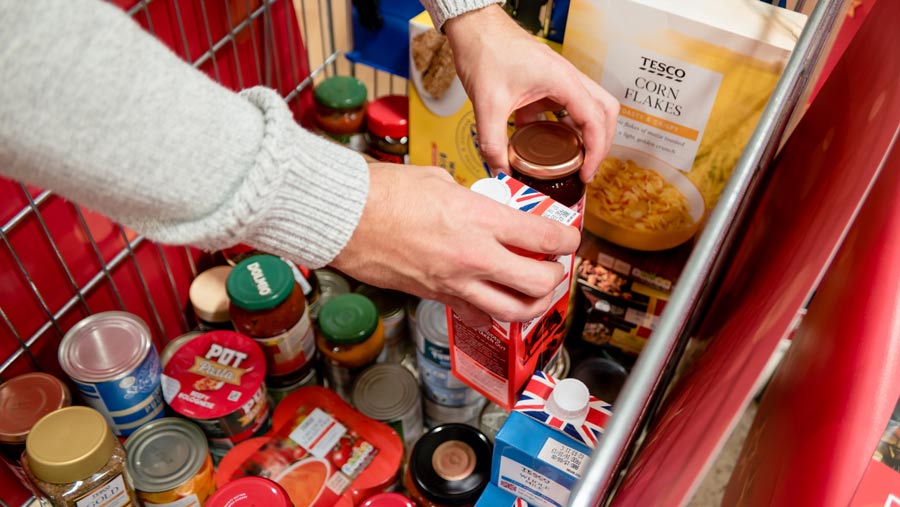COP26: Five supermarkets vow to halve climate impact by 2030
 © Adobe Stock
© Adobe Stock The bosses of five major UK supermarkets have committed to halve the environmental impact of the average UK shopping basket by 2030.
Chief executive officers from Sainsbury’s, Tesco, Waitrose, Co-op and Marks &Spencer signed the pledge at the UN COP26 climate summit.
The partnership will see bosses share data with the World Wild Fund for Nature (WWF) through a new initiative called “basket measures” (PDF).
See also: COP26: Unions seek more government support for farming
The aim is to turn the food and agriculture system from a driver of climate change into a nature hero, by cutting negative impacts and boosting regenerative agriculture to restore nature.
It will focus on seven key themes – climate change, deforestation, sustainable agriculture, sustainable diets, marine, waste and packaging.
Under the agreement, WWF will ask the supermarkets to report back at least annually on the progress being made on each of these areas, both to itself and the public.
A list of outcomes and measures has been agreed for each of the seven areas. For agriculture, there are four main measures:
- At least 50% of whole produce and grains to be certified or covered by a robust environmental scheme
- 100% meat, dairy and eggs, including as ingredients, sourced to “better” standards
- At least 50% of fresh food sourced from areas of sustainable water management
- Agricultural emissions lowered in line with 1.5C science-based targets.
The pledge also seeks to reduce food waste in all aspects of the supply chain by 50%.
Signing the WWF’s Retailers’ Commitment for Nature, the supermarkets bosses said: “As CEOs of leading UK food retailers, we recognise that a future without nature is a future without food. By 2030 we collectively need to halt the loss of nature.”
The pledge was launched to mark Nature Day at the Glasgow summit (6 November).
‘Game-changing’ pledges
WWF chief executive Tanya Steele said it would not be possible to limit global warming to 1.5C above pre-industrial temperatures without making major changes in the food supply chain.
“Food production is one of the biggest threats to our planet and we will only tackle the climate and nature emergency if food retailers play their part,” Ms Steele said.
“The promises these CEOs have made are game-changing and we hope other food retailers will follow in their footsteps, so that every shopper can be confident that the products they buy aren’t fuelling the climate crisis and pushing precious wildlife closer to the brink.”
Tesco has already been working with the WWF to halve its environmental impact of food production over the next decade. It has achieved 11% of its target in the last year. It is hoped that more retailers will add their names to the initiative soon.
Scottish young farmers ‘ready to take on climate challenge’
Young farmers in Scotland have highlighted the efforts they are taking to mitigate climate change and encourage biodiversity.
NFU Scotland’s Next Generation committee and the Scottish Association of Young Farmer Clubs (SAYFC) have spelt out the work they are doing to tackle the twin challenges.
In an open letter (PDF) to Scotland’s rural affairs cabinet secretary, Mairi Gougeon, the organisations voiced concerns that a “disproportionate amount of blame” for the current climate crisis will be placed at the door of the agricultural industry.
However, young farmers across the country say they are ready to take up the challenges of reducing emissions and increasing biodiversity, acknowledging that these are challenges we all must face.
“Changes are already happening within our industry, and the way farms are run is becoming much more climate friendly,” says the letter. “This is through various methods, from the machines we use, right down to the way we treat our soils in order to lock in more carbon.
“Regenerative farming measures, such as minimum tillage, rotational grazing, cover crops, buffer zones to encourage wildlife and the use of GPS are only a few examples of some of the ways that farmers are taking advantage of new methods and technologies.”
While Scottish farmers and crofters are already engaged in leading change, the letter calls for further investment into applied, farmer-led research “to ensure we can close the gap to net zero”.
New developments in genetic selection of animals and the use of feed additives to reduce enteric methane emissions in ruminant livestock should be investigated, the letter notes.
Separately, NFUS president Martin Kennedy said he was “pleasantly surprised” to see “long overdue recognition” for the massive part that grasslands play in storing carbon.
Mr Kennedy tweeted a photo of a stand at COP26 highlighting the nature-based solutions grassland provide as carbon sinks.
Pleasantly surprised to see this on the UN stand at COP. Long overdue recognition that grasslands play a massive part when it comes to carbon storage. After speaking to those on the stand there was clear acceptance that proper grazing management has a vital role. About time. pic.twitter.com/BWlKT8gRHx
— Martin Kennedy (@MartinKennedyVP) November 6, 2021
